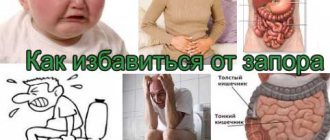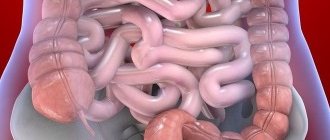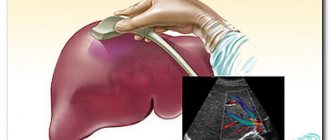What suppositories can be used for newborns for constipation?
Many young mothers face the problem of constipation in their baby.
Concern arises when there are no bowel movements for one to two days. As you know, babies under three months of age must empty their bowels on average 2-4 times a day. Babies aged about 1 year - 1-2 times during the same period of time. Gases are formed in the gastrointestinal tract of newborns who have difficulty defecating, which leads to their painful condition. The child cries more often than usual. As a rule, the problem of constipation occurs in children under 1 year of age. At this time, the baby’s digestive system has not yet fully formed and the digestion process is often disrupted.
How to use rectal suppositories without causing harm
Carefully read the instructions for using medications for constipation, taking into account all available contraindications. If your baby has hypersensitivity to the components, you should replace it with another type of drug.
Rules for the use of rectal suppositories:
- for ease of administration of the drug, lay the child on his side and press his knees to his chest;
- to facilitate the application process, you should lubricate the baby’s anal area with Vaseline;
- To prevent the inserted suppository from slipping out, hold your buttocks in a compressed state for several minutes;
- Use suppositories for constipation for no more than 10 days.
Important! With prolonged and unsystematic use of suppositories for constipation, side effects may develop: allergies in the form of rashes, indigestion, stool obstruction in the intestines, and cancer may also occur. Complications can be very serious, so laxative suppositories should be used only in emergency situations.
Causes of constipation in newborns
- Violation, incorrect regimen or sudden change in diet (including too early introduction of complementary foods or eating monotonous food);
- The child is not active enough, moves little;
- Insufficient body weight of the child;
- The weather is too hot;
- Lack or deficiency of plant fiber in the diet;
- Rickets;
- Lactose deficiency.
How to help a child with constipation
Pediatricians recommend various remedies for constipation in newborns. If a child is given artificial formula as food, then in this case it is worth trying to switch to fermented milk products for children. This will help improve digestion. For a child over 4-5 months of age, fruit and vegetable purees or juices can be added to the diet. Oatmeal mixture will also help relieve constipation.
The mother should not forget to do gymnastics for the baby before each meal. The “bicycle” exercise helps improve digestion - when lying on the child’s back, the legs are alternately pressed to the stomach.
Doctors do not recommend using laxatives before the age of 1 year. These drugs can cause the body to lose adequate amounts of potassium and protein. They also negatively affect the voiding reflex.
It is best to consult a doctor who can expertly determine the cause of constipation and recommend the most appropriate treatment method.
Glycerin suppositories to combat constipation
Glycerin suppositories contain glycerin, sodium carbonate and stearic acid as additional components. The absence of aggressive substances in their composition allows the drug to be used even for children under one year old. The effect of such drugs is based on softening stool and mild irritation of the mucous membrane. Due to this, reflex emptying occurs.
If children have anal fissures, hemorrhoids or inflammation of the digestive system, it is necessary to refrain from using such products. If the pharmacy only carries regular glycerin suppositories for adults, they can also be used for children by cutting off the necessary part, taking into account the age of the baby. They differ only in the amount of glycerol concentration in one suppository.
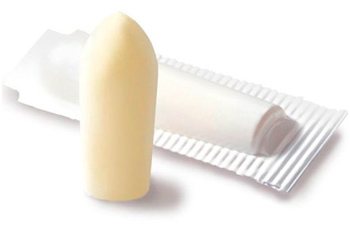
One children's suppository contains 1.24 grams of glycerol, and one adult suppository contains 2.11 grams. It is recommended in the instructions for infants and children 2-3 years old to use half a child's suppository, for children 4-5 years old one whole suppository, and for children over 6 years old to use 2 children's or one adult suppository. The drug is administered one day per day 20-30 minutes after the morning meal. The desired result is achieved 20-30 minutes after application.
Quite often, doctors prescribe Glycelax baby suppositories for constipation for children under 1 year of age. There is no need to calculate how to cut a regular glycerin suppository. One suppository of this drug contains as much active ingredient as a child of any age needs to facilitate the process of defecation.
Is it possible for newborns to use glycerin suppositories?
Recently, more and more parents are deciding to use glycerin suppositories for constipation in newborns. This same remedy is recommended by many pediatricians.
It is possible to prescribe suppositories with glycerin to a child as a treatment for constipation, but it should be remembered that such suppositories are used only for children over three months of age. If your baby is under this age, be sure to consult with a qualified healthcare professional before using glycerin suppositories.
Glycerin suppositories themselves do not cause addiction in a newborn, but only have an irritating effect on the rectum, stimulating the process of defecation. A negative effect can only occur if the use of suppositories is abused in large quantities and too often.
How can I help my baby?
When problems arise with bowel movements, parents think about how to help their newborn with constipation. It is worth remembering that many traditional methods are dangerous and can harm the baby. Under no circumstances should you insert a piece of soap into the anus, as this causes burns to the mucous membrane and discomfort.
To understand how to help a newborn with constipation, it is worth remembering a proven method - an enema. Water can only be used at room temperature, and in order to enhance the relaxing effect, you should add a little glycerin.
You should not give your child saline or laxative enemas without a doctor’s prescription. If bloody streaks or mucus are noticed in the stool, you should immediately consult a specialist about further actions.
Constipation suppositories for newborns with glycerin, sea buckthorn suppositories, and the drug Mikolax have a good effect. For a baby up to one year old, 1/3 of a suppository is sufficient, but they should not be used often.
Contraindications
Doctors do not recommend using glycerin-based suppositories for children who suffer from acute hemorrhoids, as well as for infants with inflammation of the rectum or a fissure in the anus.
77 tips for maternal and child health
Subscribe to the newsletter and receive a PDF book by email
- Obstetrics/gynecology (4)
- Obstetrics/gynecology (32)
- Uncategorized (7)
- Children's diseases (70)
- Sexually transmitted diseases (59)
- Gastroenterology (7)
- Diseases (184)
- Immunology (28)
- Infectious diseases (199)
- Medicines (61)
- Urology (20)
qualified specialist
Contact us by phone
This Privacy Policy governs the processing and use of personal and other data by the Vitaferon employee (website: vitaferon.com), responsible for Users’ Personal Data, hereinafter referred to as the Operator.
By transferring personal and other data to the Operator through the Site, the User confirms his consent to the use of this data under the conditions set out in this Privacy Policy.
If the User does not agree with the terms of this Privacy Policy, he must stop using the Site.
Unconditional acceptance of this Privacy Policy is the start of use of the Site by the User.
1.1. Website – a website located on the Internet at the address: vitaferon.com.
All exclusive rights to the Site and its individual elements (including software, design) belong to Vitaferon in full. The transfer of exclusive rights to the User is not the subject of this Privacy Policy.
1.2. User – a person using the Site.
1.3. Legislation – the current legislation of the Russian Federation.
1.4. Personal data – personal data of the User that the User provides about himself independently when sending an application or in the process of using the functionality of the Site.
1.5. Data – other data about the User (not included in the concept of Personal Data).
1.6. Submitting an application - filling out by the User the Registration form located on the Site, by indicating the necessary information and sending it to the Operator.
1.7. Registration form – a form located on the Site, which the User must fill out to submit an application.
1.8. Service(s) – services provided by Vitaferon on the basis of the Offer.
2. COLLECTION AND PROCESSING OF PERSONAL DATA.
2.1. The Operator collects and stores only those Personal Data that are necessary for the provision of Services by the Operator and interaction with the User.
2.2. Personal data may be used for the following purposes:
2.2.1. Providing Services to the User, as well as for information and consulting purposes;
2.2.2. User identification;
2.2.3. Interaction with the User;
2.2.4. Notifying the User about upcoming promotions and other events;
2.2.5. Conducting statistical and other research;
2.2.6. Processing of User payments;
2.2.7. Monitoring of the User's transactions in order to prevent fraud, illegal bets, and money laundering.
2.3. The operator processes the following data:
2.3.1. Last name, first name and patronymic;
2.3.2. E-mail address;
2.3.3. Cell phone number.
2.4. The User is prohibited from indicating personal data of third parties on the Site.
3. PROCESSING PROCEDURE FOR PERSONAL AND OTHER DATA.
3.1. The Operator undertakes to use Personal Data in accordance with the Federal Law “On Personal Data” No. 152-FZ of July 27, 2006 and the Operator’s internal documents.
Constipation suppositories for children
Probably the very first childhood problem is the baby’s stool: either he poops every half hour (you don’t have time to change the diaper), or he pushes to no avail for the second day in a row. And both situations force parents to run around the baby, either with rice water or with an enema, or to “rummage” on the Internet in search of information about an effective medicine that would make life easier for both the child and his parents.
A little about constipation
Constipation is a very common phenomenon, both in very young and very old people. There are many reasons for its occurrence. What is constipation? This is not only the absence of stool for several days due to a violation of the movement of feces through the intestines, but also a difficult act of defecation, when feces are still passed, but they are hard and too large in diameter, or even even resemble sheep feces.
When can you talk about constipation? First, you need to figure out how many times a day a child should go “to the toilet in a big way.” Infants (up to one year old) poop as many times as they eat (ideally). Gradually, trips to the toilet are reduced to 1-2 times a day. If the baby does not poop for 2-3 days, you can already provide him with first aid, determining the causes of this condition. Secondly, always pay attention to the stool (their consistency). Only by the age of three does feces become “formed”, and before that it is very liquid and mushy. If a child (especially a baby) suffers from straining, he needs help.
What are the causes of constipation? This question is very important! Only after finding out the causes of constipation can you begin to treat it. Unfortunately, many parents solve the problem of constipation using “grandmother’s methods,” and those who are more modern use medications. Without a doubt, both will work, but will it cure constipation? We can talk about the causes of constipation for a long time, because in fact there can be a lot of them and very different: from emotional mood to congenital pathologies in the structure of the rectum (for example, Hirschsprung’s disease - a section of the intestine does not have nerve cells and is not able to participate in contraction) . Constipation can also be caused by endocrine diseases (for example, diabetes) and, of course, problems of the colon and rectum (intestinal obstruction, tumors, scarring of tissue that makes the intestines obstructed).
That is why, if you have symptoms of constipation, do not rush to give your baby a candle or an enema, but find out the reason. Of course, before it is established, you simply must alleviate your child’s condition.
Causes of problems with bowel movements
Constipation is a prolonged absence of stool or incomplete bowel movements. In children of the first year of life, the norm is to have bowel movements up to 7-8 times a day (ideally after any meal). As the baby grows, trips to the toilet decrease to 1-2 times. If the child does not poop for three days, you should help the child and determine the reasons for the delay in defecation.
Before answering the question “what suppositories are inserted into a child for constipation,” it is necessary to determine the possible reason for the lack of bowel movements.
Causes of stool retention in children:
- Changing the type of feeding.
- Sedentary lifestyle.
- Stress test.
- Use of iron-based supplements.
- Infections and congenital pathologies.
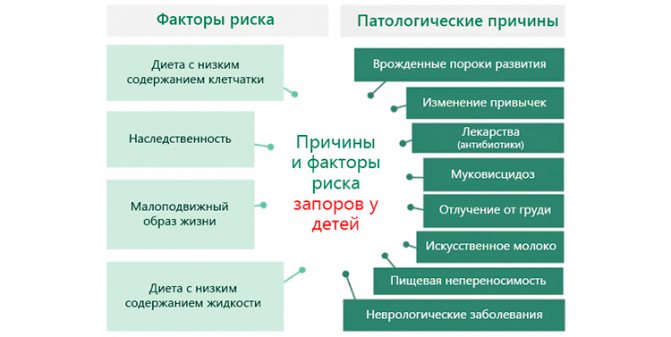
Only a doctor can identify the true cause, so if your baby experiences constipation quite often, seek help from a specialist. Naturally, before finding out the cause, you need to choose the right drug and improve the child’s situation. For constipation in children, laxative suppositories or products in the form of syrups, drops, capsules, tablets or powder are used orally.
For constipation in children, suppositories are the most effective remedy. Their frequent use will lead to the fact that the baby will not be able to empty himself. Today, pharmacy windows are replete with a variety of these remedies for constipation. To choose the right anti-constipation medication for children, you need to know what age they are suitable for and for what purpose they are used.
Children can only use two types:
- glycerin - soak and promote excretion of feces;
- gas-forming suppositories, which, when the drug dissolves, creates gas, and the baby begins to feel the urge to defecate.
Glycerin suppositories are more effective and safe, so they must be present in the children's medicine cabinet.
Features of constipation in the first year of life

At the same time, many of their organ systems are still poorly developed, stable neurohumoral regulation, and, consequently, the relationship between them has not been established.
Under these conditions, all the infants’ forces will be aimed at maintaining their life, growth and development, which is actually achieved through food, sleep and physical activity.
Causes
Due to the incompetence of the gastrointestinal tract, the appearance of constipation does not always signal the development of a pathological process, but only indicates the need for correction of nutrition, drinking and physical activity.
If these measures are ineffective, it becomes necessary to consult a pediatrician to further establish the true cause of constipation in children. Sometimes this makes it possible to exclude serious diseases or begin their timely treatment, preventing the development of complications in the future.
Difficulties with bowel movements in early childhood may occur for the following reasons:
- Poor nutrition of the mother during breastfeeding, exposure to bad habits - smoking and drinking alcohol;
- Uncoordinated transition to mixed or artificial feeding;
- Errors when introducing complementary foods to infants;
- Eruption of baby teeth;
- Failure to comply with the thermal chain;
- Rickets;
- Functional damage to the intestine (impaired motility and muscle tone, defecation reflex, changes in the anorectal zone and pathology of the innervation of the perineal muscles, stress factors);
- Organic intestinal damage (inflammation, infectious process, tumors, adhesions, diverticula, hernias, polyps);
- Congenital anomalies of intestinal development (megacolon, dolichosigma) or birth injuries;
- Hirschsprung's disease;
- Metabolic disorders in hypothyroidism, celiac disease, lactose intolerance;
- Food allergies.
We should also not forget about the possibility of developing defecation disorders due to psychological factors. This may occur due to early separation from the mother, an unfavorable atmosphere in the family, or the child’s fear of pain.
Main features

Considering the individual development dynamics of each child, the absence of bowel movements should not always be perceived as constipation. This is only true if there are 2 or more of the following signs:
- Prolonged absence of bowel movements, which contradicts the individual frequency of stool of newborns;
- Changes in the consistency of stool - its compaction (can be rocky or dry), discharge in small amounts in lumps;
- Emptying requires excessive straining;
- General disturbance in the well-being of infants - lethargy or irritability, tearfulness, restless sleep;
- Decreased appetite;
- In the chronic course - anemia, deterioration of the skin and its appendages, developmental delays.
A sharp increase in intra-abdominal pressure with strong straining in children in the first months of life is dangerous due to the formation of hernias of the anterolateral abdominal wall.
The addition of fever with increased body temperature, vomiting, loss of consciousness, convulsions, diarrhea, severe bloating, intestinal colic, as well as the detection of traces of blood in the stool is an indication for emergency medical help.
Candles as first aid
The acute development of severe defecation disorder often requires a quick response from parents. Often they do not know which remedy for constipation for infants to choose, so it is best to consult with a pediatrician.
Even today, most laxatives for constipation in newborns are contraindicated or have limitations. When performing a cleansing enema or using oral medications, such as syrups, forced bowel movements occur.
This primarily explains why they should not be used frequently. In such a situation, the state of the intestinal microflora, its peristalsis and sphincter tone suffers. In fact, you can prevent the formation of a natural bowel reflex or diarrhea.
Advantages

Constipation suppositories for children have the following advantages:
- They act locally without causing serious disturbances in the overlying parts of the gastrointestinal tract;
- They do not have a generalized effect (only a small part of the drug enters the systemic bloodstream);
- Available without a prescription, affordable;
- It is preferable in terms of the method of administration of the drug. Not every child will drink syrup or endure a cleansing enema;
- The effect occurs quickly - within 10-20 (25) minutes from the moment of administration;
- Providing a suppository for constipation in newborns is considered relatively safe compared to the choice of other medications.
It should be borne in mind that placing a candle is quite simple, unlike the same cleansing enema. In the absence of the appropriate skill to perform this manipulation, there remains a high risk of damage to the wall of the rectum or even the sigmoid colon with a bulb (syringe).
Operating principle
Almost all suppositories for constipation act by irritating receptors that are located deep in the mucous membrane of the rectum. This causes reflex stimulation of peristaltic muscle contraction and increased sphincter tone.
Children's suppositories for constipation in most cases contain various substances (glycerin, petroleum jelly), which transform from a solid state to a more liquid state under the influence of the child's normal body temperature. Thus, they envelop the mucous membrane, further improving emptying.
At the same time, the stool indirectly softens, which facilitates bowel movements without causing discomfort to the baby.
Some features

They are suitable solely as a one-time way to ease bowel movements in order to improve the child’s condition before visiting a doctor. This is largely due to the fact that it is quite difficult to calculate the dosage for a newborn, especially in the first months of life. The risk is that external assistance may disrupt the process of its adaptation to environmental conditions.
If constipation appears as the first sign of a congenital abnormality of intestinal development or an infectious-inflammatory disease, laxative suppositories can only worsen the situation.
How to choose and use laxative suppositories for children
Constipation suppositories for children are the first thing you need to purchase. After all, every parent knows that the baby’s first problem is stool: either the baby constantly poops, or he simply grunts and strains without results for several days. In any case, exhausted parents are worried and are looking for a way to help their child.
For preschoolers and infants, the optimal means of inducing stool are candles. Let's take a little look at which rectal tablets for constipation you should buy and how they should be used correctly.
Causes of problems with bowel movements
Constipation is a prolonged absence of stool or incomplete bowel movements. In children of the first year of life, the norm is to have bowel movements up to 7-8 times a day (ideally after any meal). As the baby grows, trips to the toilet decrease to 1-2 times. If the child does not poop for three days, you should help the child and determine the reasons for the delay in defecation.
Before answering the question “what suppositories are inserted into a child for constipation,” it is necessary to determine the possible reason for the lack of bowel movements.
Causes of stool retention in children:
- Changing the type of feeding.
- Sedentary lifestyle.
- Stress test.
- Use of iron-based supplements.
- Infections and congenital pathologies.
Only a doctor can identify the true cause, so if your baby experiences constipation quite often, seek help from a specialist. Naturally, before finding out the cause, you need to choose the right drug and improve the child’s situation. For constipation in children, laxative suppositories or products in the form of syrups, drops, capsules, tablets or powder are used orally.
For constipation in children, suppositories are the most effective remedy. Their frequent use will lead to the fact that the baby will not be able to empty himself. Today, pharmacy windows are replete with a variety of these remedies for constipation. To choose the right anti-constipation medication for children, you need to know what age they are suitable for and for what purpose they are used.
Children can only use two types:
- glycerin
- soak and promote excretion of feces; - gas-forming suppositories
, which, when the drug dissolves, creates gas, and the baby begins to feel the urge to defecate.
Glycerin suppositories are more effective and safe, so they must be present in the children's medicine cabinet.
Glycerin suppositories to combat constipation
Glycerin suppositories contain glycerin, sodium carbonate and stearic acid as additional components. The absence of aggressive substances in their composition allows the drug to be used even for children under one year old. The effect of such drugs is based on softening stool and mild irritation of the mucous membrane. Due to this, reflex emptying occurs.
If children have anal fissures, hemorrhoids or inflammation of the digestive system, it is necessary to refrain from using such products.
If the pharmacy only carries regular glycerin suppositories for adults, they can also be used for children by cutting off the necessary part, taking into account the age of the baby.
They differ only in the amount of glycerol concentration in one suppository.
One children's suppository contains 1.24 grams of glycerol, and one adult suppository contains 2.11 grams. It is recommended in the instructions for infants and children 2-3 years old to use half a child's suppository, for children 4-5 years old one whole suppository, and for children over 6 years old to use 2 children's or one adult suppository. The drug is administered one day per day 20-30 minutes after the morning meal.
The desired result is achieved 20-30 minutes after application.
Quite often, doctors prescribe Glycelax baby suppositories for constipation for children under 1 year of age. There is no need to calculate how to cut a regular glycerin suppository. One suppository of this drug contains as much active ingredient as a child of any age needs to facilitate the process of defecation.
Sea buckthorn and rosemary suppositories as a treatment for inflammation
Sea buckthorn candles are completely natural in composition. Soft suppositories with sea buckthorn oil perfectly relieve inflammation and irritation, and also promote rapid healing of wounds. Indications for the use of such drugs are the presence of inflammation or cracks in the baby’s bottom, which is a contraindication for use for other types of suppositories.
If your baby is 2-3 years old, it is better to use half of the product at night; children under 6 years old should be administered one suppository once a day (preferably at night), and children aged 6-14 years should take 1 suppository in the morning and evening.
Quite often, for prolonged constipation and the presence of hemorrhoids in children, as well as to increase immunity and relieve inflammation, pediatricians prescribe Econika suppositories. The main component of this product is rosemary. Such drugs are allowed to be used only by children over 7 years of age. Suppositories are used as prescribed by a doctor 1 time per day.
How to use rectal suppositories without causing harm
Carefully read the instructions for using medications for constipation, taking into account all available contraindications. If your baby has hypersensitivity to the components, you should replace it with another type of drug.
Rules for the use of rectal suppositories:
- for ease of administration of the drug, lay the child on his side and press his knees to his chest;
- to facilitate the application process, you should lubricate the baby’s anal area with Vaseline;
- To prevent the inserted suppository from slipping out, hold your buttocks in a compressed state for several minutes;
- Use suppositories for constipation for no more than 10 days.
Important! With prolonged and unsystematic use of suppositories for constipation, side effects may develop: allergies in the form of rashes, indigestion, stool obstruction in the intestines, and cancer may also occur. Complications can be very serious, so laxative suppositories should be used only in emergency situations.
Summarize
Laxative suppositories can contribute to the emergence of new diseases if you abuse them. If your baby experiences prolonged and frequent constipation, consult a specialist. It will help you correctly understand the possible causes of constipation and select effective treatment.
Think about it: maybe if your child is constipated, it will be enough to increase the consumption of fresh vegetables and add more exercise? Review his diet. If you cannot do without laxatives, choose, store and use them correctly.
Source: https://zen.yandex.ru/media/id/5ac7a61c4bf161ef0d73e2ce/kak-podobrat-i-primeniat-slabitelnye-svechi-detiam-5ac7aed0f0317313f624d393
Best views
Rectal suppositories for newborns who have problems with bowel movements do not get rid of the cause, but only temporarily eliminate the symptom. Therefore, they are used only in extreme cases, when the situation is dire and safer measures have not had the desired effect.
Infants are not recommended to administer rectal suppositories for constipation on their own for longer than three days.
The list of drugs for rectal administration, unfortunately, is small, which is due to the impossibility of using complex pharmaceutical drugs in children.
The following suppositories for constipation are most effective for newborns:
- Glycerin based;
- Based on sea buckthorn oil.
There are also gas-forming suppositories, but their use in newborns is prohibited. As an alternative remedy, you can use Microlax, which is also injected into the rectum (there is a special line for children from 0 to 3 years old).
Glycerin suppositories
The most famous representative is the drug "Glycelax". They can be used for hypo- and atonic constipation, as well as other disorders of the gastrointestinal tract in the perinatal period.
The main active ingredient, as you might guess, is glycerin. Its absorption from the rectal mucosa occurs quickly and almost completely. It is metabolized in the liver, while being a substrate for gluconeogenesis (increases the concentration of glucose in the blood plasma). As a result, only 7-14% is excreted in the urine.
Contraindications
The following contraindications for use exist:
- Individual intolerance to the components of the drug (including auxiliary);
- Exacerbation of hemorrhoids;
- Inflammation of the mucous membrane of the colon;
- Rectal tumors;
- Severe nephropathy (kidney failure)

It is also possible to develop local allergic reactions in the form of itching and burning of the skin. During breastfeeding, you should always consult your doctor.
Terms of use
Suppositories for newborns are inserted into the rectum. Before this, it is advisable to calm the child, perform a soothing massage of the abdomen with stroking movements, and then, lifting the legs, carefully place it in the anus.
It is advisable to use them only after 3 months of age and for older children (0.75 g once a day).
Treatment should be stopped after normal intestinal motility is restored. Next, preference should be given to non-drug measures (diet, exercise, massage) if there is no need to continue therapy.
Before insertion, suppositories do not need to be lubricated with mineral liquid or solid oils.
Sea buckthorn candles
Sea buckthorn suppositories are less effective than glycerin suppositories, but they also have wound healing and anti-inflammatory effects.
The drug itself is affordable, simple and safe to use to combat constipation in children. But you also shouldn’t use it on your own for more than 2-3 days, especially if the problem does not go away. In this case, it is necessary to carry out diagnostic measures in order to clarify the cause of the development of the pathological process.
Contraindications

That is, the product is made exclusively on a natural basis, which has a minimum of contraindications for use due to the absence of ballast components. The risk exists only if there is an allergy to sea buckthorn or cross-reactions with other plants. They should also not be used for prolonged diarrhea (often followed by constipation in newborns), severe inflammatory diseases of the gastrointestinal tract and cholelithiasis.
In rare cases, they indicate the development of local hypersensitivity reactions in the anorectal area.
Types of suppositories
If there is a need to take it, it is advisable to select the optimal version of the candle, familiarize yourself with the composition, and take into account the possibility of allergies as a common side effect.
Let's look at the market for anti-constipation suppositories in our network of pharmacies:
- Sea buckthorn specimens are classified as natural-based medicines. Sea buckthorn oil has restorative properties and relieves inflammation at the site of the disease. It contains a large amount of alpha acids, which function in the intestinal tract against constipation. Suppositories are hypoallergenic. They can be used by people prone to allergies. Due to the mild manifestation of their action, they are prescribed to children, pregnant and lactating women. Tannins, fatty acids, amino acids prevent inflammation and infections. The instructions indicate that the laxative effect of use is weak. These candles have a different area of application. Often, problems with stool in children under 6 years of age create the problem of cracks in the anus. When visiting a doctor during complex healing measures, sea buckthorn suppositories are prescribed as healing and sedatives. Dosage for children under 6 years of age – 1 candle per day. Reviews from the use vary, but according to the instructions, relief occurs on the second day of use.
- Constipation suppositories made from soap products are often recommended by doctors for children. These are homemade candles that are made in the likeness of a candle. They are inserted into the anal canal, irritate its receptors and promote emptying, providing a bactericidal effect at the site of localization;
- Papaverine is useful for constipation due to its antispasmodic effect. Papaverine suppositories, entering the intestinal environment, begin to dissolve, relieve spasm in the lower section and promote its emptying. Along the way, suppositories, containing an opium alkaloid, are used in the treatment of various pathologies. But the main thing is that they are prohibited for use by children under 6 months. And they are not even recommended for an older child;
- Suppositories for proctogenic constipation of a laxative nature Bisacodyl or its analogue Dulcolax. They stimulate the nerve endings of the colon receptors and mucus production. As a result, pressure in the intestines increases. Thanks to this, it retains fluid, which softens the excrements, making defecation easier. According to the instructions, Bisacodyl can be taken by children from 2 years of age. But, according to reviews, up to 6 years of age, its use must be coordinated with a doctor.
- Suppositories for constipation with glycine are not considered effective, since they have a different purpose.
- Suppositories after surgery for constipation help to have bowel movements while organ functions are restored. Bisacodyl is often used as a suppository for these purposes. Its influence is focused on stimulating intestinal receptors, increasing mucous secretions, which help the passage of increments. After anal penetration, the result of evacuation occurs within a couple of hours;
- Microlax suppositories relieve constipation within a quarter of an hour and do not affect areas of the digestive system. Microlax contains sodium citrate. Action after administration – softens the excrements, stimulates peristalsis and achieves good results in emptying. Microlax is indicated for use by newborns, pregnant women and other categories of the population. It has different release forms;
- In its action, Glycelax has something in common with Microlax: irritating, stimulating, softening quality. The remedy covers a wide range of constipation: multifunctional, age-related, neurological, predetermined by an immobile way of existence, pregnancy, martyrdom of defecation. Suitable for any age category, including babies from 3 months. Glicelax is contraindicated in the acute phase of hemorrhoids, paraproctitis, tumors, and renal failure.
- Viferon belongs to the immunomodulating agents and has significant antiviral activity. It is allowed for use by everyone, including babies on their first day of life, to cure viral lesions. It is for constipation that suppositories are not used, because they themselves can provoke it.
- For problems with stool in children, medications of various categories are used. Candles are considered an excellent way to provide immediate relief, but their frequent use is prohibited. Glycerin suppositories are best. They act gently, without causing much discomfort to children. Gas-forming suppositories are more painful due to the release of solid feces, which can injure the rectum.
